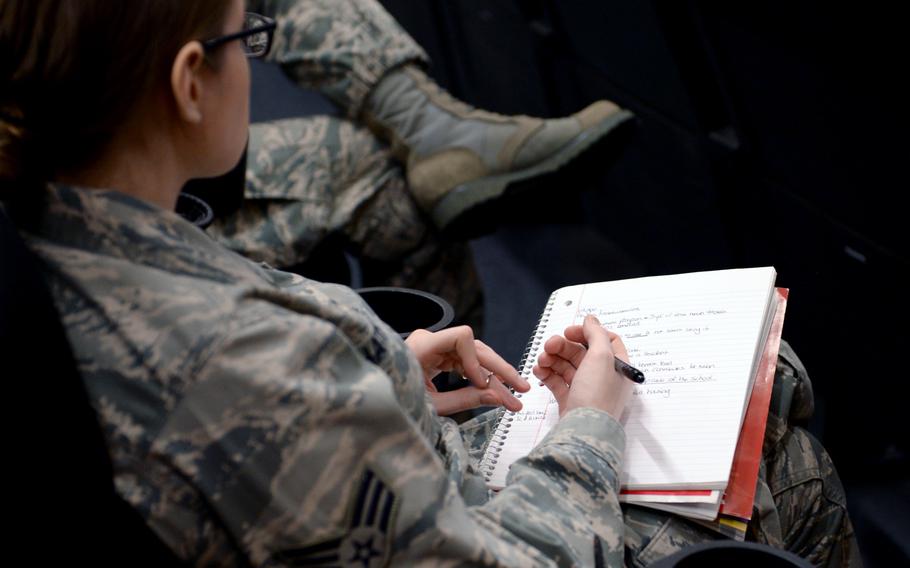
A U.S. Airman takes notes during a briefing on educational benefits given by a Veterans Affairs representative at the base theater at Spangdahlem Air Force Base, Germany, March 24, 2014. (Alexis Siekert/U.S. Air Force)
The Senate education committee held a confirmation hearing this week for Linda McMahon, President Donald Trump’s nominee to be the next U.S. secretary of education. It’s important they approve her appointment so she can begin correcting the past four years of the Department of Education’s regulatory overreach.
When asked, 53% of veterans, active duty personnel, reservists and National Guard members say they enlisted for the education benefits. Those rates are even higher among women (62%) and minorities (61% to 71%). Given the military’s current recruiting crisis, you’d wonder why anyone would mess with a good thing.
But the bureaucrats at the Department of Education and Department of Veterans Affairs seem to have adopted an attitude of “condescending paternalism” — a presumption that veterans and military members are not smart enough to choose higher education options that are right for them. These agencies’ infantilization reached new heights under the Biden-Harris administration with a cavalcade of new and modified regulations to protect military and veteran students from their own apparent stupidity.
Trump, McMahon and the 119th Congress have an opportunity, if not a mandate, to undo the federal overreach of the past four years, enshrine veterans’ right to freely use their earned benefits, and implement guardrails to prevent the regulatory system from being politicized. And they should act immediately to get it done. Here’s where lawmakers can start:
1. Rescind unnecessary and biased regulations:
The Biden-Harris administration’s 90/10 and Gainful Employment rules are glaring examples of regulations that apply only to proprietary colleges and universities. If these “protections” are so necessary, why not require all colleges and universities to meet the same standard? One analysis found that only 60% of programs at private nonprofit schools and 70% at public colleges and universities would pass the Gainful Employment benchmark. These rules are not meant to protect military and veteran students’ education benefits, but to protect the “privileged” market position the Education Department has preserved for traditional private and public colleges.
2. Pass the Ensuring Distance Education Act:
Online learning is exploding in popularity. Most college students enrolled in at least one online class during the 2022/23 academic year, a 50% increase in just three years, and today more than 40% of military students complete their post-secondary education exclusively online (including this author). Introduced by Rep. Burgess Owens, R-Utah, in the last Congress, the Ensuring Distance Education Act (H.R. 8761) empowers colleges and universities to innovate, expand learning options, and enhance educational access. Congress should pass this bill quickly.
3. Clear the program participation agreement backlog that hangs over 700 schools:
Every college and university that receives federal student aid must complete and maintain a program participation agreement, a pledge to provide a quality education. Yet over 5,000 programs at nearly 700 institutions are on provisional program participation agreements, including the London School of Economics and Political Science, which this author attended using U.S. government-funded student aid. This regulatory purgatory creates uncertainty for students and colleges, since there is no clarity whether or when a school’s good standing will be reinstated. The Education Department must clear the backlog and implement clear criteria for reinstatement.
4. Provide stability for online collegiate coursework partnerships:
Hundreds of top colleges rely on online program managers for advice, technical support and marketing of their web-based classes. The Biden administration tried to increase regulations in 2023 but dropped its plans when scores of university administrators testified about the important role online program managers play in serving more students at a lower cost. If confirmed, McMahon should protect these partnerships from further meddling by codifying the bundled services exemption.
5. Drain the swamp and include more veterans in negotiated rulemaking:
The negotiated rulemaking regulatory process has become an opaque channel for the Education Department to circumvent congressional legislative intent and impose its own agenda through unique, and questionable, legislative interpretation. What’s worse, there is virtually no transparency into the criteria and selection process for representatives, who are supposed to broadly represent the affected stakeholders. Congress should work with McMahon to pull back the curtain and diversify those selected.
6. Empower, don’t punish, alternative paths to higher education
Over the past four years federal regulators pushed a regulatory agenda that looks down on military and veteran students and discourages student choice. Working with the Trump administration, the 119th Congress has a chance to dismantle this regulatory crusade and finally provide nontraditional students with much-needed certainty. For our veterans, service members and armed forces, it is imperative that they get started as soon as McMahon is confirmed.
Bob Carey is executive director of National Defense Committee, a retired U.S. Navy captain, former national security adviser to two U.S. senators, and a former Senior Executive Service employee of both the departments of Defense and Energy.